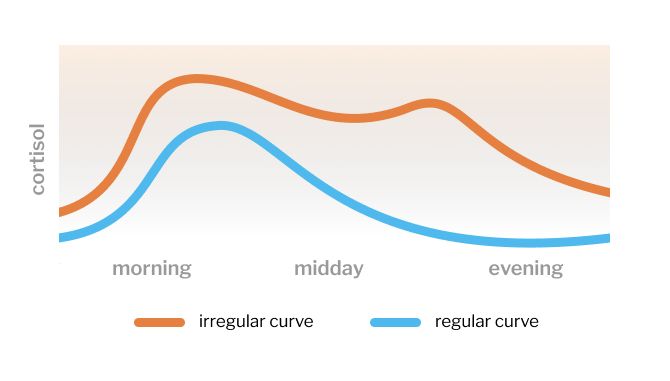Insights and recommendations powered by Slated AI Coach
The science behind stress, and how to manage it


The human body is picky. It likes things just so—a body temperature of 36.6 to 37.4 degrees celsius, a blood pH between 7.35 and 7.45, etc. And it has to keep itself within these strict parameters all whilst dealing with an ever-changing environment and a variety of demands placed upon it.
Everything we do—from getting out of bed and digesting breakfast, to working out and dealing with illness—requires the many systems of the body to adapt their function to keep up with the demands we place on them. For example, if the body didn’t adapt when we started running, we’d very quickly run out of fuel in our blood and collapse—assuming the huge increase in body temperature didn’t get us first.
These challenges and demands (a.k.a. stressors) aren’t just physiological, such as a change in temperature, or the energetic demands of running—they also encompass psychological or social stressors, such as debt, public speaking, or an argument with a spouse. Typically, when people talk about ‘stress’ they mean that one or more of these stressors has been hard to bear and is negatively impacting their wellbeing. While a little bit of stress can be a good thing, sometimes this hard-to-bear stress is so extreme, or so prolonged, that it can be bad for our health.
Let’s look at an example.
Maybe you find giving presentations at work a little stressful (perhaps because you simply don’t like public speaking, or because your manager tends to be unreasonably critical). On a good day (i.e. after a good night’s sleep, a hearty breakfast and an easy commute), when the time comes you might get a little knot in your stomach and maybe lose a little of your usual sharpness, but it’s over quickly, and you usually feel the stress dissipating before you’ve even sat down. You crush a workout at the gym after work and head home for a restful sleep.
However, this morning you argued with your spouse about that thing you always argue about, and that new weights program at the gym has left you feeling more physically drained than usual. On top of that, you got an unexpected bill in the post, so now your commute involves worrying about your finances, re-running the argument with your partner, and getting irritated by the person next to you who obviously has a cold and isn’t wearing a mask.
Now, when the time comes to give your presentation, you really don’t feel up to it, and you end up mixing up some of your data because your mind was a jumble of worries. It just doesn’t go well. You go to the gym after work despite feeling off and your back twangs while picking a kettlebell. You’re in pain. You’re stressed. That night you struggle to sleep, tossing and turning, and by the morning you can feel a cold coming on.
The role of cortisol
To understand some of what is going on here, we need to talk about a veritable word salad of chemicals known as stress hormones: vassopressin, adrenaline, noradrenaline, gonadotropin...the list goes on. These hormones stimulate a cascade of changes in how certain tissues and organs function, helping the body to adapt to stress. The king of the so-called stress hormones, and most important to our story here, is cortisol.
Almost every cell in the body has a receptor for, and is thus influenced by, cortisol. It’s a big deal. Increased levels of cortisol lead to all sorts of bad things, from suppressed immune function and increased blood pressure to slower digestion and impaired memory (amongst other things).
So if cortisol is so bad, why do we have it at all? Well I'm going to throw you a curve ball now and tell you that cortisol is actually great. You need it. If you had no cortisol you wouldn’t even be able to get out of bed in the morning.
Cortisol is actually the result of stress, not the cause of stress. Think of it as an energy management hormone, rather than a stress hormone. It prepares the body for an increased expenditure of energy, and switches the body's priorities from long term health—like healing, digesting, and making witty comments to impress your colleagues—to short term survival, like making plentiful energy available in the blood for our muscles, and helping us to react quickly to life threatening situations.
But what does emotional stress—like criticism from your boss, or an argument with your partner—have to do with survival? They're unpleasant, yes, but why would they trigger cortisol, if cortisol is about survival?
In the modern world, where the individual is king, it's easy to forget that humans were originally pack animals: tribal, and totally reliant upon our relationships with others for survival. Our ancient ancestors simply couldn’t survive alone for long. We depended on others in the group to hunt with, for mutual protection, and to care for us if sick, injured, pregnant, asleep, or old. This is why loneliness is so stressful: until very recently in our evolutionary history, a human on their own in the wild was a very vulnerable human. A failed social relationship could be an existential threat.
In this context, it makes sense for the body to respond to stress by preparing for energetically-taxing activities, such as running the hell away from a saber-toothed tiger. If you were kicked out of your tribe for presentation-based incompetence, you wouldn’t have had any mates watching your back, or backing you up, spear in hand. This is also why things like financial or housing insecurity are so stressful—if your basic needs like food or housing are insecure, this is perceived by our biology as a survival issue, leading to increased cortisol.
The downsides of elevated cortisol
High levels of cortisol over a long period of time can have a negative impact upon various facets of our health. Specifically, excess cortisol can:
- Increase blood sugar and insulin resistance, which affects cell health and metabolism, and can increase risk for developing type-2 diabetes;
- Inhibit the process of wound healing and tissue remodelling after injury;
- Lead to lower-quality sleep, as well as the avalanche of negative health consequences associated with chronic poor sleep; and
- Impair adaptation to rehab/training, meaning you’ll improve more slowly in response to training.
All of this is to say that too much cortisol is not just bad for your health, it’s also a barrier to getting better!
It's important to remember here that we’re not saying that a little bit of stress is bad for you. It’s not. Doing something that challenges you, gets your heart racing, or feels exciting is good for you, psychologically as well as physically. The point is that all stressful things have an effect on your cortisol, and a healthy lifestyle involves having waves of higher and lower cortisol throughout the day, called the ‘diurnal cortisol curve’.
In a healthy curve, cortisol is high in the morning then gradually tapers off throughout the rest of the day. But when we’re chronically stressed, the body releases cortisol at all hours, the curve is a rollercoaster, which can lead to all the less-than-optimal outcomes outlined above.

If your lifestyle leads to elevated cortisol levels throughout the day, day after day after day, then you’re going to be in trouble.
How to manage your stress/cortisol levels
We live in a world of deadlines, newsflashes, credit card bills, and annual reports—all of which amp up our stress levels, without leaving enough downtime to balance things out. However, that doesn't mean there aren't things you can do help manage your stress.
1. Manage your high-intensity exercise load
Don’t train all-out every single day, and be prepared to back off on the high-intensity exercise if you have too many other major stressors in your life (like fighting an illness, a lack of sleep, or an unusually difficult week at work). In this scenario, opt for lower-intensity exercise (i.e. the type of activity where you can still hold a conversation while doing it), which will have less of an impact on your cortisol levels.
2. Take a few deep breaths and deliberately relax
Sounds simple right? Deliberately slowing the breath, particularly by elongating the ‘out’ breath, can have a subtle calming effect on our nervous system (this is known as dampening sympathetic autonomic activity, for the nerds out there). You could try just five breaths before a presentation, or even spend 20 minutes doing this before bed. Breathe in for a count of four, and out for a count of eight.
3. Find some time to meditate
The effect of meditation on the body is the exactly opposite to that of stress. By triggering the body's relaxation response, it can cultivate resilience in the face of emotional stress, help the body repair itself and prevent new damage from the physical effects of stress. Finding a few minutes per day to meditate is one of the best things you can do to help with stress. There's no right or wrong way to meditate—so download a few meditation apps and find what works best for you.
4. Get in a quick stretch session
Stretching reduces cortisol, and feels good. It relieves muscle tension, allowing your muscles to let go of where you're carrying stress, helping you to relax and sleep better. This can be yoga-style stretching, or a simple routine for your hips, spine, and shoulders. Stretching for 20 minutes before bed is a great way to calm everything down and help you get a restful sleep.
References
‘Behave’ - Robert Shapolsky - evolution and function of Cortisol and Stress
https://pubmed.ncbi.nlm.nih.gov/18787373/ exercise intensity and cortisol
https://www.ncbi.nlm.nih.gov/pmc/articles/PMC5455070/ breath and cortisol
https://www.jssm.org/jssm-19-695.xml%3EFulltext stretching and cortisol
https://pubmed.ncbi.nlm.nih.gov/28863392/ meditation and cortisol

Ryan is a UK trained Osteopath and the Director of Calibrate: an Osteopathy & Physiotherapy practice on Orchard Rd, Singapore. He has a Masters Degree in Osteopathy, Sports Nutrition Certification and Master Functional Trainer Qualification.


